ทักษะ Speaking (การพูด) เป็น 1 ใน 4 ทักษะของ IELTS ซึ่งแบ่งเป็น 3 ระดับความยากและหัวข้อที่แตกต่างกัน จากนั้นคณะกรรมการจะประเมิณความสามารถในการพูดของคุณ มาสำรวจคำถามที่มักจะเจอในข้อสอบ IELTS Speaking Part 1 2 3 และเคล็ดลับการตอบคำถามที่มีประสิทธิภาพกับ ELSA Speak ด้านล่างนี้กันนะ
โครงสร้างข้อสอบ IELTS Speaking
โครงสร้างการสอบ IELTS Speaking มี 3 ส่วน (3 บท) ในแต่ละส่วนมีโครงสร้างที่แตกต่างกันแต่เป้าหมายทั้งหมดคือประเมินความสามารถของผู้สอบในการสื่อสารและแสดงความคิดเห็นโดยการพูดเป็นภาษาอังกฤษเกี่ยวกับหัวข้อเฉพาะ
สอบก่อนเข้าฟรี

| ส่วนที่สอบ | เวลาและข้อกำหนดเฉพาะสำหรับแต่ละส่วน |
| Part 1 (Introduction and Interview) | เวลา 4 ถึง 5 นาทีเนื้อหาและข้อกำหนด การทดสอบส่วนแรกกำหนดให้ผู้เข้าสอบตอบคำถามสั้นๆ เกี่ยวกับหัวข้อที่คุ้นเคยในชีวิตประจำวัน เช่น บ้านเกิด อาชีพ ที่พักอาศัย งานอดิเรก ครอบครัว |
| Part 2 (Long turn) | เวลา ผู้เข้าสอบมีเวลา 1 นาทีสำหรับการเตรียมตัวและ 2 นาทีในการนำเสนอเนื้อหาและข้อกำหนด ในส่วนนี้ผู้เข้าสอบจะได้รับกระดาษแผ่นเล็กๆ ที่มีหัวข้อและคำถามแนะนำ เพื่อช่วยให้ผู้เข้าสอบค้นหาแนวคิดเกี่ยวกับหัวข้อเฉพาะ ซึ่งโดยทั่วไปจะอธิบายถึงบุคคล วัตถุ สถานที่ หรือเหตุการณ์ หลังจากการนำเสนอ 2 นาที คณะกรรมการสามารถถามคำถามเพิ่มเติมเกี่ยวกับเนื้อหาคำตอบของผู้เข้าสอบได้ |
| Part 3 (Discussion) | เวลา 4 ถึง 5 นาทีเนื้อหาและข้อกำหนด ผู้เข้าสอบจะถูกถามคำถามหลายข้อที่เกี่ยวข้องกับหัวข้อในส่วนที่ 2 อย่างไรก็ตาม คำถามเหล่านี้มักจะมีลักษณะเป็นนามธรรมมากกว่าและต้องการให้ผู้เข้าสอบมีความรู้ที่หลากหลายเกี่ยวกับสังคมเพื่อหารือและเปิดกว้างเกี่ยวกับปัญหา |
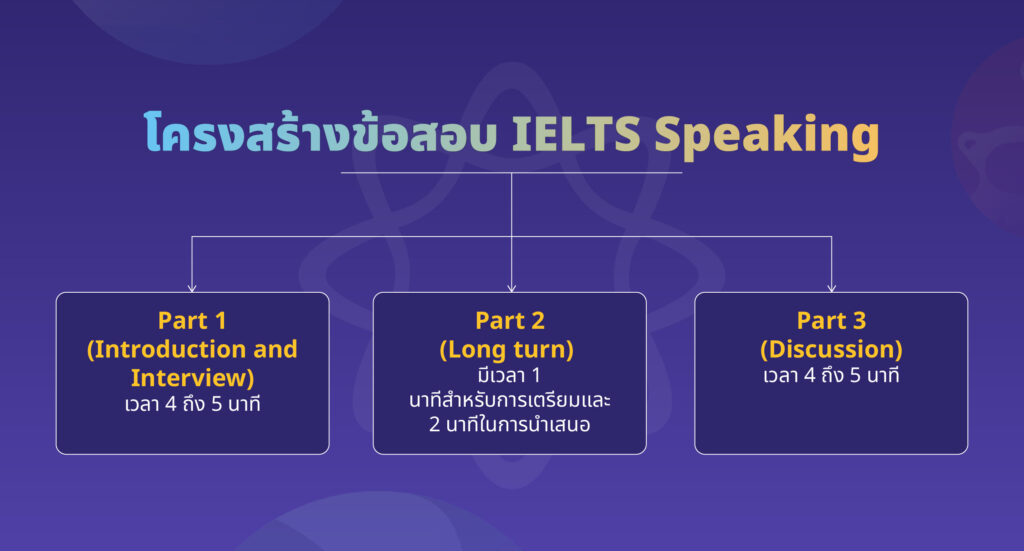
เกณฑ์การให้คะแนนของการสอบ IELTS Speaking
วิธีการให้คะแนนสำหรับการสอบ Speaking จะเหมือนกันทั้งประเภท Academic และ General เวลาในการสอบโดยประมาณ 15-20 นาที คณะกรรมการจะประเมินผลงานของผู้สอบตามเกณฑ์ 4 ประการต่อไปนี้
- Fluency and Coherence (ความคล่องแคล่วและการเชื่อมโยงกัน) เกณฑ์ในการประเมินความคล่องแคล่วในการพูดและการเชื่อมโยงแนวคิดในการทดสอบ ขณะเดียวกัน เกณฑ์กำหนดให้ต้องรักษาความยาวที่เหมาะสมสำหรับแต่ละส่วนและตอบคำถามที่เน้นตรงประเด็น
- Lexical Resource (ความสามารถในการใช้คำ) เกณฑ์การประเมินระดับการใช้คำศัพท์ที่หลากหลายในหัวข้อต่างๆ รวมกันอย่างถูกต้องและอยู่ในบริบทที่ถูกต้อง
- Grammatical Range and Accuracy (ไวยากรณ์มีความหลากหลายและแม่นยำ) เกณฑ์ในการประเมินความสามารถในการรวมโครงสร้างไวยากรณ์ต่างๆ ได้อย่างยืดหยุ่นและแม่นยำ
- Pronunciation (ออกเสียง) เกณฑ์การประเมินทักษะการออกเสียง น้ำเสียง ความเร็วในการพูด และความสามารถในการนำเสนออย่างชัดเจนและเข้าใจได้
แต่ละเกณฑ์ข้างต้นจะได้รับคะแนนตั้งแต่ 0 ถึง 9 และนำมารวมกัน จากนั้น คณะกรรมการจะใช้ค่าเฉลี่ยเพื่อให้ได้คะแนนสุดท้ายของการสอบ IELTS Speaking
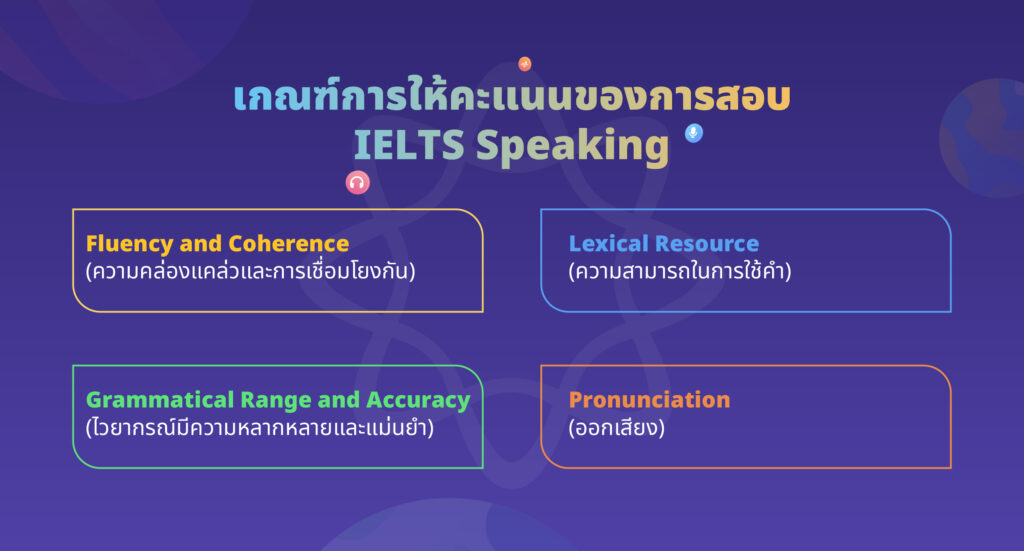
>>> Read more:
- สอบ IELTS ที่ไหนดี เรื่องที่คุณควรรู้เกี่ยวกับการสอบ IELTS
- IELTS SCORE – วิธีคำนวณคะแนนและเกณฑ์การให้คะแนนสำหรับทั้ง 4 ทักษะ
วิเคราะห์ตัวอย่าง IELTS Speaking Part 1 2 3 ตามหัวข้อทั่วไป
ตัวอย่างคำถาม IELTS Speaking Part 1 ตามหัวข้อ
ในส่วนที่ 1 คณะกรรมการจะให้ผู้สอบแนะนำชื่อและแสดงบัตรประจำตัวของคุณ แล้วจะถูกถามคำถามทั่วไปเกี่ยวกับตัวคุณเอง เช่น คุณอาศัยอยู่ที่ไหนหรือกำลังทำอะไรอยู่ (ทำงานหรือเรียนอยู่)
หลังจากนั้น คุณจะได้รับการถามคำถามบางคำเกี่ยวกับหัวข้อที่คุ้นเคย อย่างเช่น ประเภทเพลงที่คุณชอบ การทำอาหาร อากาศหรือภาพยนตร์ที่คุณชื่นชอบ ปกติแล้วคุณจะถูกถามหนึ่งหรือสองหัวข้อ คณะกรรมการจะถามคำถามจากสคริปต์และฟังคำตอบของคุณ โดยขอให้คุณขยายคำตอบด้วยคำถาม เช่น “ทำไม” หรือ “ทำไมจะไม่ได้?” ถ้าคำตอบของคุณสั้นเกินไป
การทดสอบส่วนนี้เป็นไปตามรูปแบบคำถามและคำตอบ โดยเน้นไปที่ความสามารถของคุณในการสื่อสารแนวคิดและข้อมูลเกี่ยวกับหัวข้อในชีวิตประจำวันโดยการตอบคำถามหลากหลายข้อ
ด้านล่างนี้คือตัวอย่างคำถาม IELTS Speaking Part 1 ตามหัวข้อเพื่อให้คุณอ้างอิง
| หัวข้อ | คำถาม |
| Accommodation & Hometown | Let’s talk about your hometown. • Where is your hometown? • What do you like about it? • What do you not like about it? • How important is your hometown to you? • Do you think you will continue to live in your hometown? Let’s move on to talk about accommodation. • Tell me about the kind of accommodation you live in? • Does the place you live in have many amenities? • Is there anything you would like to change about the place you live in? • Do you plan to live there for a long time? • Do you live in a house or a flat? • Is it a big place? • How long have you lived there? • What do you like about living there? •Is there a garden in the place you live in? |
| Hometown & Weather | • What is your country famous for? • Where do you live in your country? • Is it an interesting place to live? • Are you planning to live there in the future? • How is the weather today? • What’s your favorite kind of weather? • Is there any type of weather you really don’t like? • What is the climate like in your country? • Does the weather affect people’s lives in your country? • Do people change in the summer? • Does bad weather ever affect transport in your country? • Tell me about the weather in your country at different times of the year? • Which time of the year did you enjoy the most when you were a child? • Do you (usually) pay attention to the weather forecasts? • Has the weather changed much in your country in recent years? |
| Work | • Do you have a job right now? • Do you enjoy your job? • What responsibilities do you have at work? • What is your typical day like at work? • What would you change about your job? • What job do you think you will be doing in five years? • What skills and qualifications are required for this job? • Do you work or study? • Do you get on well with your co-workers? • Are there good work opportunities in your home country? |
| Volunteer Works | • Have you ever worked before? • What was your first day at work like? • What responsibilities did you have at work? • What was your typical day like at work? • Have you done any volunteer work? • Why did you do the volunteer work? • Do you know any volunteers? • How do you define volunteer work? |
| Family & Housework | • How many people are there in your immediate family? • Who do you get on best within your family? • Do you have a large extended family? • What do you do together with your family? • Why is family important to you? • Do you do housework at home? • What kind of housework do you often do? • Did you do housework when you were a child? • Do you think that children should do housework? |
| Books & TV | • Do you like watching TV? • How often do you watch TV? • What kind of TV programmes do you like to watch? • What are the most popular TV shows in your country? • Has the internet affected your viewing habits? • How often do you read? • Do you like reading books? Why? • Do you have many books at home? • Do you prefer to buy books or borrow them?What are the benefits of reading? |
| Celebrity & Computer | • Do you use computers? • What do you use a computer to do? • Did you use computers when you were little? • Do people often use computers these days? • Will people continue to use computers in the future? • Who is your favorite celebrity? • Do you like any foreign celebrities? • Would you want to be a celebrity in the future? • Do you think we should protect famous people’s privacy? • How do celebrities influence their fans in your country? |
| Movies & Music | • How often do you go to the cinema? • Are cinema tickets expensive in your country? • What are the advantages of seeing a film at the cinema? • Do you usually watch films alone or with others? • Which actor would you like to play you in a film? • How do you listen to music? • When do you listen to music? • What’s your favorite kind of music? • Is music an important subject at school in your country? • What kinds of music are (most) popular in your country? |
| Music & Newspaper and Magazine | • What’s your favorite kind of music? • Do you like to listen to live music? • Is live music popular in your country? • Have you ever been to a concert before? Or Have you ever been to a musical performance? • Do you often read newspapers? • Do you prefer to read local news or international news? • Which is more popular where you live, newspapers or magazines? • Do many people today read newspapers? • In the future, do you think more people than today will read magazines, or fewer people? • Do you think newspapers will be very important to you in the future? |
| Music & Travel | • Where was the last place you visited on holiday? • Would you like to go back there again? • What kind of tourist destinations do you usually prefer? • Has a foreign visitor ever stayed at your home? • What’s the best way to save money while traveling? • How much time do you spend listening to music every day? • Are your music tastes varied? • What is your favorite song? • Do you like to sing along to your favorite songs? • Are you learning to play a musical instrument at the moment? |
| Internet & Major | • How important is the Internet to you? • Do you use the Internet more for work or in your free time? • Do you think you use the Internet too much? • How will the Internet develop in the future? • Are there any negative things about the Internet? • What is your major? Or what was your major? • Did you or do you like it? • Is it a popular major at your university? • If you could change to another major, what would it be? • Would you change it if you had the chance? |
| Internet & Outdoor Activities | • Do you like outdoor activities? • What outdoor sports do you like? • How much time do you spend outdoors every week? • What types of outdoor activities are popular in your country? • How often do you use the Internet? • Do you think you use the Internet too much? • What are your favorite websites? • What are the positive and negative things about the Internet? |
| Indoor Activities & Transportation | • Do you prefer public transportation or private transportation? • What’s the most popular means of transportation in your hometown? • Is it easy to catch a bus in your country? • Is driving to work popular in your country? • What do you think will become the most popular means of transportation in your country? • Do you like indoor activities? • What indoor activities do you like? • How much time do you spend indoors every week? • What types of indoor activities are popular in your country? |
| Major & Sports | • Do you work or study? • What is your major? Or what was your major? • Why did you choose that major? • What is the most difficult part of studying that subject? • Do you plan to use the subject you are studying in the future? • Do you play any sports? • Do you watch sports on TV? • What is the most popular sport in your country? • How do people in your country stay fit? • Is it important for children to play sports? |
| Gift & Noise | • Do you mind noises? • What types of noise do you come across in your daily life? • Are there any sounds that you like? • Where can you hear loud noises? • Do you think there’s too much noise in modern society? • Are cities becoming noisier? • When do you send gifts? • When was the last time you received a gift? • Have you received a gift you didn’t like? • How do you feel when you receive a gift? • Do people in your country send gifts to show their generosity? |
| Patience & Politeness | • What do you think patience is? • Do you think patience is important? • Do you think you are a patient person? • Have you ever lost your patience? • Are you a polite person? • Who taught you to be polite? • Is it important to be polite? • What do you do if others are not polite to you? |
| Colors & Weather | • What’s the best season of the whole year? • What do people normally do in that season? • What’s the weather usually like in your country (or, your hometown)? • How is the weather here different from the weather in your home country? • What colors do you like? • What’s the most popular color in your country? • Do you like to wear dark or bright colors? • What’s the difference between men and women’s preference for colors? • Do colors affect your mood? |
| Food & Weather | • Do you have a healthy diet? • Do you prefer eating at home or eating out? • Do you like ordering food to be delivered? • Who do you get food delivered with? • Do you eat meals differently now compared to when you were little? • What sort of weather do you like the most? • Would you say the weather in your hometown is suitable for working (or studying)? • Would you like to move to a place with different weather? • What season (or weather) do you think is most suitable for work and/or study? |
| Clothes & Photos | • What is your favorite item of clothing? • Are there any traditional clothes in your country? • Where do you usually purchase your clothes? • Have you ever bought clothes online? • Who do you usually take photos of? • How do you keep your photos? • Do you keep your photographs on your computer? • Have you framed any of your photos? • Do you prefer to send postcards to people or to send photos that you took yourself? |
| Art & Photography | • Do you like art? • Do you think art classes are necessary? • How do you think art classes affect children’s development? • What kind of paintings do people in your country like? • What benefits can you get from painting as a hobby? • Do you like to take photographs? • Do you prefer to take photos yourself or to have other people take photos? • How often do you take photographs? • Do you prefer to take pictures of people or of scenery? • Are there any photos on the walls of your home? |
| Bags & Boat | • Have you ever taken a ride on a boat? • Do you like traveling by boat? • What are the advantages of traveling by boat? • Do people in your country like to travel by boat? • Will it get more popular in the future? • Do you like bags? • What types of bags do you like? • Do you usually carry a bag (when you go out)? • What types of bags do you use in your everyday life? • What do you put in these bags? • What sorts of bags do women like to buy? |
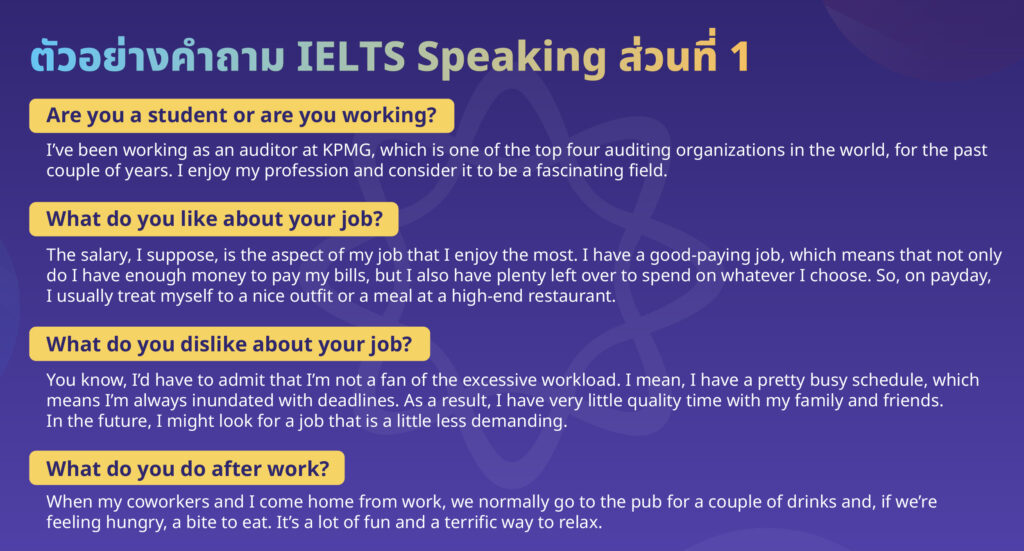
ตัวอย่างคำถาม IELTS Speaking Part 2 ตามหัวข้อ
หลังจากจบ IELTS Speaking ส่วนที่ 1 แล้ว คณะกรรมการจะเสนอหัวข้อและคุณจะต้องพูดเกี่ยวกับเรื่องนี้ประมาณหนึ่งถึงสองนาที หัวข้อจะถูกเขียนลงบนการ์ด และคุณจะได้รับกระดาษและดินสอสำหรับจดบันทึกด้วย บนการ์ด คุณจะเห็นคำแนะนำในการพูดและประเด็นที่คุณสามารถพูดถึงในการบรรยายเกี่ยวกับหัวข้อนั้นได้
คุณจะมีเวลาหนึ่งนาทีในการเตรียมตัวและจดบันทึกก่อนที่จะเริ่มพูด คณะกรรมการจะใช้เครื่องจับเวลาและแจ้งให้คุณทราบเมื่อหมดเวลาเตรียมตัว และแจ้งให้คุณทราบเมื่อถึงเวลาเริ่มพูด รวมถึงเตือนคุณว่าจะเริ่มสอบ IELTS Speaking ภายใน 2 นาที คะแนนบนการ์ดจะช่วยให้คุณคิดว่าจะพูดอะไร และคุณควรพยายามพูดอย่างต่อเนื่องเป็นเวลา 2 นาที พวกเขาอาจถามคำถามเกี่ยวกับสิ่งที่คุณพูดก่อนที่จะไปยังส่วนต่อไป
| หัวข้อ | คำถาม |
| Advertisements | Describe an advertisement that persuaded you to buy a product. |
| Art | Talk about a painting you would like to have in your home. |
| Books | Talk about a book you are reading now or have read recently. |
| Talk about a book you have never read but would like to read. | |
| Business | Describe a small business you want to start. |
| Change | Describe a positive change in your life. |
| City | Describe your favorite city or a city you have visited that you like very much. |
| Company | Describe an organization or a company that you know. |
| Electronic devices | Describe a useful electronic device you would like to own. Describe a piece of electronic equipment that you have. Describe a piece of electronic equipment that you find useful. |
| Environment | Describe an environmental problem or event. |
| Exciting experience | Describe an exciting experience you’ve had. |
| Family | Talk about the last time your whole family got together. Describe a family member that you get on well with. Describe one of your relatives. |
| Food | Describe a famous food from your hometown or country. |
| Friends | Describe a friend who has played an important part in your life. Describe a friend you had in primary school. |
| Clothes | Describe your favorite piece of clothing. |
| Furniture | Describe a piece of furniture that you own. |
| Gifts | Describe a present that you gave someone. |
| Health | Describe your (or your friend’s) experience with an illness or injury. Describe something healthy you enjoy doing. |
| Help | Describe a time when you helped someone. |
| History | Describe a historical place that you have visited. |
| Holiday | Talk about an activity you like doing when you are on holiday. Talk about somewhere you went on holiday. Talk about your dream holiday. Talk about your plans for your next long vacation. |
| Influence | Describe someone who has had an important influence in your life. |
| Internet | Describe a website that you often use. |
| Language | Talk about one method of learning a foreign language you have used. Talk about an English language book you have read or used. Talk about a language test you have taken. |
| Late | Describe a time you were late for something. |
| Hobbies | Talk about a leisure activity you did when you were a child. |
| Machine | Describe the most useful household appliance that you have. |
| Memory | Describe an occasion when you forgot something important. |
| Money | Describe what you would do if you received a very large amount of money. |
| Music | Talk about a musical instrument you would like to be able to play but have never tried. |
| News | Describe an interesting piece of news that you have recently read about or heard about. |
| Parenting | Describe people that you know and believe to be very good parents. |
| Party | Describe the best party you have been to. Talk about a birthday party you can remember well. Describe a typical festival or celebration in your country. Describe your favorite festival or celebration. |
| Plans | Talk about one thing you are going to do next weekend. Talk about one thing you are planning to do after you pass the IELTS test. Talk about a goal or ambition you have. |
| Products | Describe something which is produced in your country. |
| Restaurants | Describe a restaurant or a cafe you often go to. |
| Rules | Describe a traffic rule or law you know about. Describe a rule you had to obey when you were in school. |
| School | Describe a school that you are attending or attended in the past. Talk about a subject you would like to study in the future. |
| Science | Describe an area of science that you are interested in. Describe a scientific subject that you learned about in high school. |
| Shopping | Describe a shopping street in your hometown. Describe a shop in your hometown or the place you are living now. |
| Social problems | Describe a problem in your city. |
| Sports | Talk about a sport you like doing or watching. Talk about a sport many people enjoy but you have never tried. Talk about a sport that interests you but you have never tried. |
| Teacher | Describe the best teacher you have had. |
| Things | Describe something you own which is very important to you. |
| Traditional products | Talk about a traditional product which is very popular in your country. |
| Transportation | Describe the transportation system in your hometown or the place you are living now. Talk about one means of transportation that you often use. |
| Travel | Describe a journey you have been on. Talk about something tourists like to do in your country. Talk about a day trip you have been on. Talk about a part of your country you have never been to but would like to visit. Talk about a foreign country you have never been to but would like to visit. |
| TV | Describe a TV programme that you often watch. |
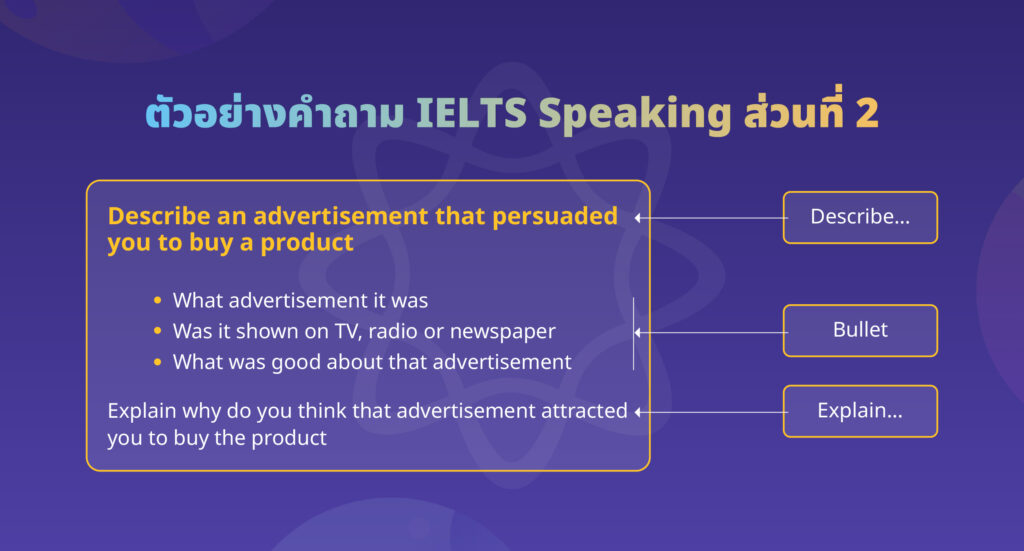
ตัวอย่างคำถาม IELTS Speaking Part 3 ตามหัวข้อ
คำถามใน IELTS Speaking Part 3 จะเกี่ยวข้องกับหัวข้อทั่วไปที่คุณพูดถึงในส่วนที่ 2 คุณจะอภิปรายหัวข้อในลักษณะทั่วไปและเป็นนามธรรมมากขึ้น แสดงให้คณะกรรมการเห็นว่าคุณสามารถแสดงและชี้แจงความคิดเห็น วิเคราะห์ อภิปราย และคาดเดาเกี่ยวกับหัวข้อนั้นๆได้อย่างครอบคลุมมากขึ้น
คณะกรรมการจะสื่อสารกับคุณมากขึ้นในส่วนนี้ และอาจขอให้คุณอธิบายแนวคิดของคุณเพื่อประเมินความสามารถในการสื่อสารเกี่ยวกับแนวคิดที่เป็นนามธรรม เทียบกับหัวข้อส่วนตัวที่คุณอภิปรายในส่วนที่ 1 และส่วนที่ 2
| หัวข้อ | คำถาม |
| Advertising | • What are popular types of advertising in today’s world? • What type of media advertising do you like most? • Do you think advertising influences what people buy? • What factors should be taken into account when making advertisements? • Is advertising really necessary in modern society? • How does advertising influence children? • Is there any advertising that can be harmful to children? • Do you think advertising influences what people buy? • Is advertising really necessary in modern society? |
| Art | • How do people in your country feel about art? • Do people in your country prefer music over art? • What are some traditional art forms in your country? • How has art changed in the past few decades in your country? • Do you think children should study art in school? • How can children benefit from learning about art? • Do you think the government should provide support for art and cultural activities? |
| Books | • Do people read more nowadays? • Do you read before going to bed? • In your opinion, how will e-books affect paper books? • What’s the difference between films and books? • What is one example of traditional literature in your country? • Do you like reading the traditional literature of your country? |
| Business | • In your opinion, do business people have to work long hours? • How do business people relax? • How can a small business grow big? • What kind of small businesses will young people have in the future? • What skills are required to start a small business? • What are the impacts of globalization on small and large businesses? |
| Change | • Do you think change is good? • What are some of the major changes that occur to people throughout their lives? • Is your country changing rapidly? • In what ways have changes in technology changed people’s lives? • Why do old people not accept change? |
| City | • In your opinion, what makes a city a good one to live in? • What are the advantages of living in a city? • What are the negative aspects of crowded cities? • How can governments improve living standards in crowded cities? • What can people do to improve the air quality in the city? |
| Company | • What is the difference between big companies and small companies? • Are there many big companies in your country? • What are the good things about working for a big company? • Should big companies be punished more seriously than small companies? • Why do some people choose to work at an international company? • How can a company maintain the quality of the service that it gives to the public? • Do you think it’s important for a company to provide after-sales service? |
| Decision | • Why do some people find it hard to make decisions? • How important is it to get advice from other people when making decisions? • Why is it sometimes difficult to accept advice? • What are some of the most important decisions young people have to make? • Do you agree that parents should make important decisions for their children? • Is it better to make a decision thinking about what you want or thinking about what other people want? |
| Electronic Devices | • What are the most popular electronic devices in today’s world? • What devices do you think will be popular in the future? • Do you think people spend too much money on electronic devices? • In what ways can electronic devices make our lives harder? • What would the world be like without computers? • Should children be taught to use computers at school? |
| Environment | • What are some of the main environmental problems in your country? • Why should people be concerned about the environment? • How can people protect the environment? • Do you think money should be spent on protecting animals? • Do you think more should be done to protect natural scenic spots in your country? • Is water pollution a problem in your country? • What can individuals do to try and ensure water is kept clean? • Do you think problems with the cleanliness of water will improve in the future? |
| Exciting Experiences | • Can you compare some exciting activities people do now with activities people did 20 years ago? • Why do some people enjoy doing dangerous sports? • Do you think some dangerous activities should be banned? • Should people try doing new things? • What problems can people have when they try new activities for the first time? • Do you think it’s best to do new things on your own or with other people? |
| Family | • Is family important in your country? • Who should be responsible to care for the elderly? Should it be the family or the government? • How has the size of the average family changed in your country in the last few decades? • How do you think families will change in the future? • Should husbands and wives have different roles within the family? • What role do grandparents play in the family in your country? |
| Food | • What are the types of food that people eat in your country? • What kinds of foreign food are popular in your country? • Is it important to have a meal together with your family? • Is food now better than in the past? • Do you think our diet is important? • What is a balanced diet? • How are the eating habits now in your country different from eating habits in the past? • How might eating habits change in the coming decades? |
| Friends | • What is the importance of friends? • Would you like to have a few very good friends or a lot of just friends? • If you had a problem, would you go to your friends or family? Why? • Is it always better to talk to your friends about such a problem? • Is it important to have friends from other countries? |
| Clothing | • Can clothing tell you much about a person in your country? • Do people still wear traditional clothing in your country? • How has clothing fashion changed in your country over the last few decades? • Why do some companies ask their staff to wear uniforms? • What are the advantages and disadvantages of having uniforms at work? • For which jobs are people required to wear a uniform in your country? • Do you think people are treated differently when they are in uniform? |
| Furniture | • In what situations do people in your country buy furniture? • In families in your country, who usually decides what furniture to buy for the home? • How do people in your country decide what furniture to buy for the home or office? • Do people in your country prefer traditional or modern styles of furniture? |
| Health | • How can people improve their health? • Do elderly people exercise much in your country? • Do you think all illnesses can be prevented? • Do you think that illnesses will be less common in the future? • Do you think healthcare should be free? • What makes someone a good doctor? |
| Helping Others | • Do you like helping others? • Do you think people are less willing to help others these days compared to the past? • Do people today trust others as much as they used to in the past? • How do people in your community help each other? • Should children be taught to help others? • How can we encourage children to help others? • How can students, such as high-school students, help each other? |
| History | • Do you think history is important? • Do you like to learn about history? • What do you think we can learn by studying history? • How can people learn about history? • Do you think people can learn history from films or TV programs? • Do you think the internet is a good place to learn about history? • What is the effect of technology on how people learn about history? |
| Holidays | • Why do people go on holiday? • How important is it for families to go on holiday together? • Why do some people go on holiday alone? • How have holidays changed over the past few decades? • What kind of holidays will be popular in the future? • Do you think it is better to take a holiday in your own country or in a foreign country? • What problems can people have on holiday in a foreign country? |
| Influence | • Why do people go on holiday? • How important is it for families to go on holiday together? • Why do some people go on holiday alone? • How have holidays changed over the past few decades? • What kind of holidays will be popular in the future? • Do you think it is better to take a holiday in your own country or in a foreign country? • What problems can people have on holiday in a foreign country? |
| Internet | • How do you think the Internet will change people’s buying habits in the future? • What are the pros and cons of shopping online? • Is the Internet important for education? • Do you think parents should supervise their children’s use of the Internet? • What’s the best way to ensure online safety? |
| Occupation | • What kind of jobs are popular in your country? • What qualities do people need to do well in their job? • Do you think people should choose a job based on salary or personal interest? • How can a company help employees improve their skills? • Do you think young people are interested in becoming entrepreneurs? |
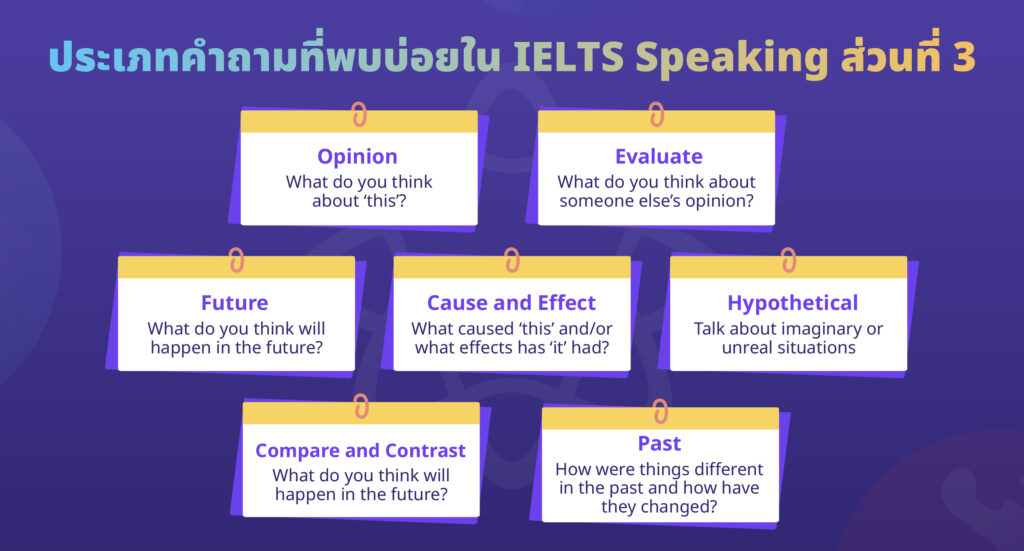
เคล็ดลับการทำแบบทดสอบ IELTS Speaking เพื่อให้ได้คะแนนสูง
ต่อไปนี้เป็นเคล็ดลับในการทำแบบทดสอบ IELTS Speaking เพื่อช่วยให้คุณได้คะแนนสูง
- อ่านคำถามอย่างละเอียด กำหนดข้อกำหนดหลัก มุ่งเน้นไปที่คำถาม หลีกเลี่ยงการฟังสั้นๆ และไม่มีคำหลัก เพราะนี่คือปัจจัยหลักที่ช่วยให้คุณกำหนดความต้องการของคำถามได้ จึงจะตอบคำตอบที่ตรงประเด็นโดยไม่นอกประเด็น
- อย่าตอบสั้นหรือยาวเกินไป หากคุณให้คำตอบที่สั้นเกินไป คณะกรรมการจะไม่มีทางรู้ได้ว่าคุณเก่งแค่ไหน ดังนั้นคุณควรพยายามขยายคำตอบของคุณด้วยคำอธิบายและยกตัวอย่าง ในขณะเดียวกัน สำหรับการตอบแบบยาว หลายๆ คนมักคิดว่ายิ่งตอบนานเท่าไรก็ยิ่งได้คะแนนสูงเท่านั้น อย่างไรก็ตาม สิ่งนี้ใช้ได้กับผู้สมัครที่มีความสามารถด้านการพูดที่ดีเท่านั้น ส่วนใครที่พูดภาษาอังกฤษไม่เก่งหรือขาดความมั่นใจการพูดนานๆบางครั้งก็ผิดพลาดได้ง่าย
- ใช้ประโยคที่หลากหลายและคำศัพท์ที่กว้างออกไป ผสมผสานประโยคง่ายๆ ประโยครวม ประโยคที่ซับซ้อน ฯลฯ หลายประเภทได้อย่างยืดหยุ่น ขณะเดียวกันการใช้คำศัพท์ขั้นสูง คำพ้องความหมาย ฯลฯ จะช่วยให้คะแนนการทดสอบของคุณสูงขึ้นด้วย
- เน้นน้ำเสียงเพื่อสร้างแรงดึงดูด ผู้สมัครหลายคนมักจะเน้นแค่ไวยากรณ์ แต่ลืมไปว่าน้ำเสียงก็มีส่วนสำคัญในการช่วยให้คะแนนสอบของคุณดีขึ้น เมื่อนำเสนอให้ใช้สำเนียงที่มั่นใจ เปลี่ยนน้ำเสียง ฯลฯ ซึ่งจะทำให้ดูน่าดึงดูดและเรียกความสนใจจากผู้ฟังมากขึ้น
- ไม่ต้องท่องจำ พูดอย่างเป็นธรรมชาติ การท่องจำเป็นกลยุทธ์ที่ผู้สอบหลายคนใช้เพื่อประหยัดเวลาและไม่ต้องคิดระหว่างทำข้อสอบ อย่างไรก็ตาม ความกดดันและความวิตกกังวลในห้องสอบจะทำให้คุณจำทุกสิ่งที่คุณท่องมาไม่ได้ ทำให้การพูดของคุณลังเลและไม่เป็นธรรมชาติ และกรรมการจะสังเกตเห็นได้ง่ายด้วย
- อย่าพูดเร็วเกินไป ใจเย็นๆ ตอบอย่างมั่นใจ ความวิตกกังวลและความรู้สึกไม่สบายที่มากขึ้นจะทำให้คุณพูดติด ๆ ขัด ๆ และขาดการเชื่อมโยงระหว่างส่วนต่าง ๆ ของการทดสอบพยายามเรียนรู้วิธีควบคุมอารมณ์ของคุณ อย่ากังวลมากเกินไปหากคุณตอบผิดโดยไม่ตั้งใจ แต่ให้สงบสติอารมณ์และมั่นใจเพื่อทำส่วนถัดไปให้เสร็จสิ้นให้ดีแทน
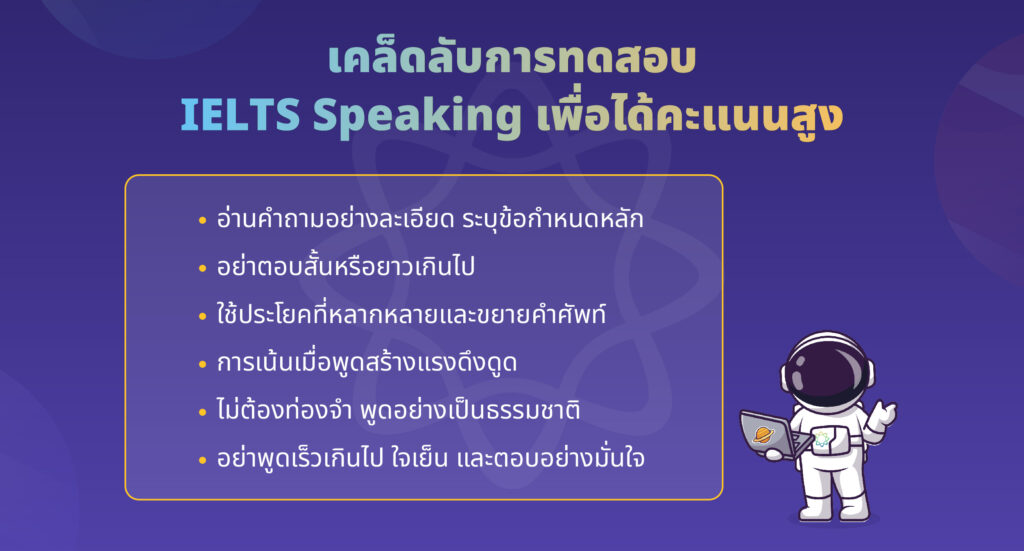
ฝึกฝน IELTS Speaking อย่างไร
หากต้องการฝึกพูด IELTS คุณสามารถดูวิธีการต่อไปนี้
- ค้นหาเพื่อน หัวใจหลักของการฝึกพูดที่มีประสิทธิภาพคือการสื่อสาร ดังนั้นคุณจึงต้องหาเพื่อนร่วมทางที่จะ “ก้าวไปด้วยกัน” บนเส้นทางการฝึกการถามตอบแบบโต้ตอบกลับเป็นภาษาอังกฤษ เพื่อนจะช่วยให้กระบวนการฝึกฝนของคุณสมจริงและมั่นใจยิ่งขึ้น ช่วยให้สมองของคุณดูดซับและสร้างปฏิกิริยาตอบสนองได้รวดเร็วยิ่งขึ้น นอกจากนี้ เพื่อนของคุณยังช่วยให้คุณตรวจจับและแก้ไขข้อผิดพลาดในการออกเสียงและการสื่อสารได้ทันที
- เสริมสร้างไวยากรณ์และเพิ่มคำศัพท์ การฝึกคำศัพท์และไวยากรณ์เป็นวิธีหนึ่งในการฝึก IELTS Speaking ที่บ้านที่คุณต้องให้ความสำคัญ นอกจากจะเข้าใจความหมายของคำแล้ว ยังต้องรู้บริบทการใช้และประเภทของคำนามเพื่อใช้ประโยคที่ถูกต้องด้วย เช่นเดียวกับประโยค คุณต้องฝึกพูดโดยใช้โครงสร้างประโยคมาตรฐานเต็มรูปแบบ เนื่องจาก IELTS ไม่ใช่การสื่อสารภาษาอังกฤษทั่วไป แต่มีข้อกำหนดทางวิชาการมากกว่า
- การออกเสียงและน้ำเสียงที่ถูกต้อง หนึ่งในเกณฑ์สำคัญในการประเมินการทดสอบการพูดคือการออกเสียง ด้วยการออกเสียงที่ถูกต้องเท่านั้นคุณจึงจะสามารถถ่ายทอดความคิดของคุณให้คณะกรรมการได้ นอกจากการออกเสียงแล้ว น้ำเสียงยังทำให้ภาษาอังกฤษของคุณเป็นธรรมชาติ นุ่มนวล และมีชีวิตชีวามากขึ้นอีกด้วย เพื่อฝึกการออกเสียงภาษาอังกฤษอย่างรวดเร็วและมีประสิทธิภาพ คุณสามารถดาวน์โหลดแอป ELSA Speak เพื่อฝึกฝนได้ทุกวัน

หนังสือเตรียมสอบ IELTS Speaking ที่ดีที่สุด 4 อันดับแรก
Understanding Vocab for IELTS Speaking 2nd Edition
หนังสือรวบรวมคำศัพท์และวลีดี ๆ เกี่ยวกับ 16 หัวข้อทั่วไปในการสอบ IELTS ในช่วง 2 ปีที่ผ่านมา (2022 และ 2023) Study, Work, Accommodation,The Internet, Technology, Tourism, Culture and Travel, Food, Places, Personality, Relationships, Decisions, Feelings, Shopping, Money.
Collins Speaking for IELTS
สำหรับผู้สมัครที่เพิ่งเริ่มทำความคุ้นเคยกับการสอบ IELTS Speaking Collins Speaking for IELTS เป็นหนึ่งในตัวเลือกที่ควรพิจารณา เนื่องจากเนื้อหาของหนังสือนำเสนออย่างเป็นวิทยาศาสตร์ โดยมีทั้งหมด 12 หน่วยพร้อมแบบทดสอบสั้นๆ คำถาม และหัวข้อต่างๆ ที่เกี่ยวข้องกับส่วนของการสอบ IELTS Speaking
นอกจากนี้ หนังสือเล่มนี้ยังให้คำแนะนำและกลยุทธ์ที่เป็นประโยชน์แก่ผู้อ่าน ช่วยให้พวกเขาพัฒนาทักษะการพูดได้อย่างรวดเร็ว
31 High-Scoring Formulas To Answer The IELTS Speaking Questions
สำหรับผู้สมัครที่ต้องการพัฒนาทักษะในการตอบคำถามในการสอบ IELTS Speaking เอกสารนี้เป็นสิ่งที่ขาดไม่ได้ เนื่องจากมีสูตรคำตอบที่แตกต่างกันถึง 31 สูตรให้ผู้เรียนใช้ในการแก้คำถามประเภททั่วไปที่พบในการสอบ IELTS Speaking ในเล่ม 31 High-Scoring Formulas To Answer The IELTS Speaking Question จะมีการยกตัวอย่างและอธิบายโดยละเอียด เพื่อช่วยให้ผู้สมัครนำไปประยุกต์ใช้ในทางปฏิบัติได้อย่างง่ายดาย
Basic IELTS Speaking
Basic IELTS Speaking เป็นสื่อการเตรียมสอบการพูดที่มีประโยชน์อย่างยิ่งสำหรับผู้เริ่มต้นโดยผู้เขียน Zhang Juan หนังสือทั้งเล่มประกอบด้วย 10 บท โดยแต่ละบทจะเน้นไปที่หัวข้อที่แตกต่างกัน ช่วยให้ผู้เรียนพัฒนาทักษะพื้นฐานในด้านคำศัพท์ ไวยากรณ์ การออกเสียง และโดยเฉพาะอย่างยิ่งการให้คำแนะนำและแนวคิดแก่ผู้เรียนเพื่อช่วยให้พวกเขาตอบคำถามได้อย่างถูกต้องและมั่นใจมากขึ้นในการสอบ IELTS Speaking
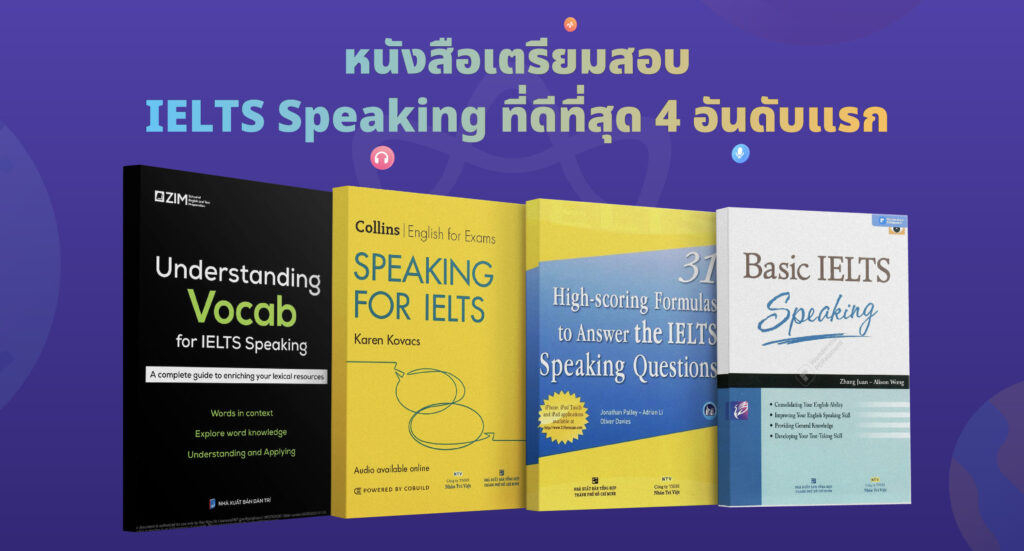
>>> Read more: [รวบรวม] 5,000 + คำศัพท์ IELTS ตามหัวข้อที่พบบ่อยที่สุด
ข้างต้นคือคำถามและเคล็ดลับทั้งหมดสำหรับการสอบ IELTS Speaking เพื่อให้ได้คะแนนสูง หวังว่าการแบ่งปันข้างต้นจะช่วยให้คุณสอบ IELTS ได้อย่างมีประสิทธิภาพ นอกจากนี้อย่าลืมเข้าชมและติดตาม ELSA Speak เป็นประจำเพื่ออัปเดทความรู้ IELTS ล่าสุดทุกวันนะ





